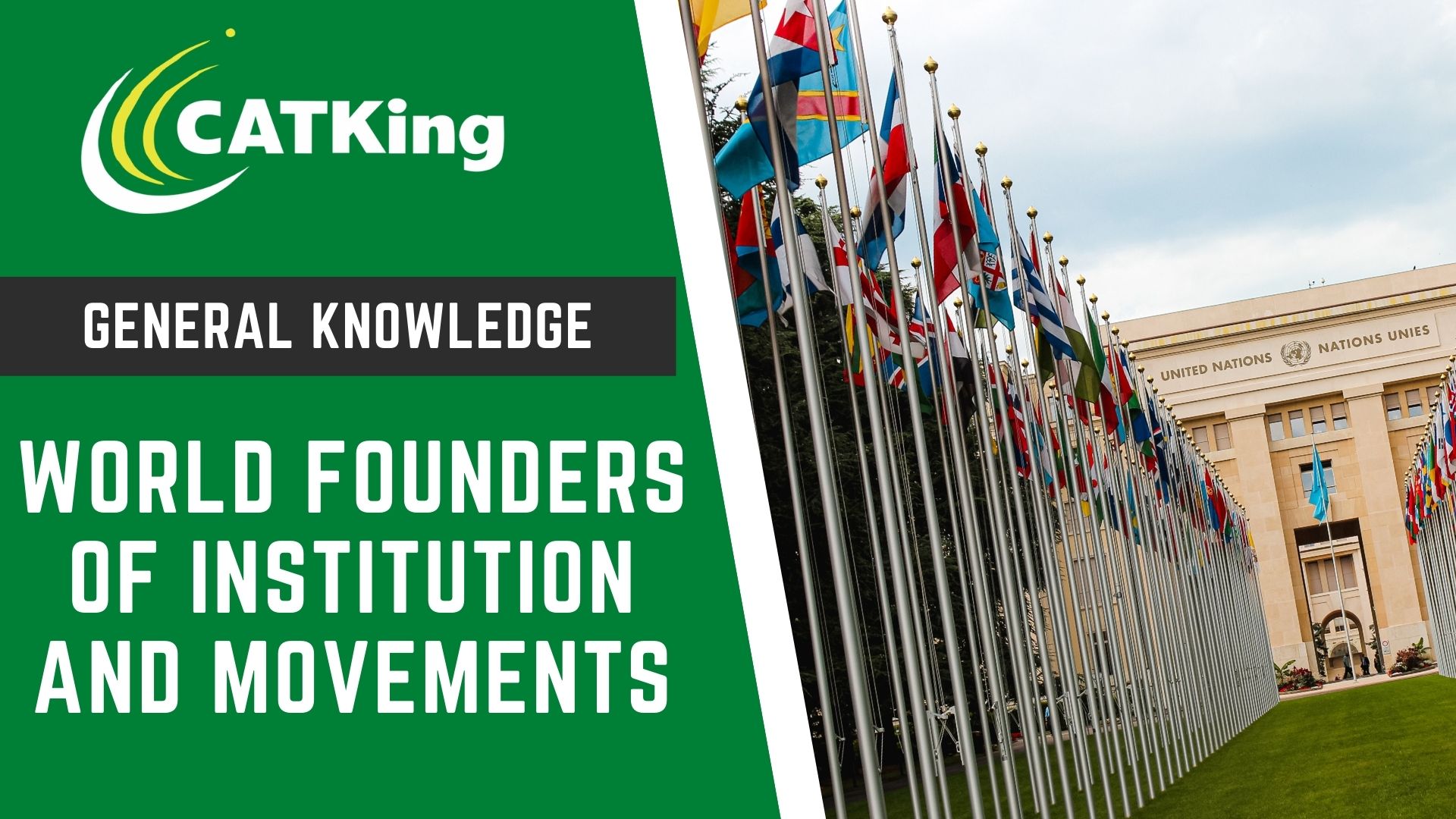World Founders of Institutions and Movements
World Founders of Institutions and Movements
Questions on Founders are common in a lot of competitive exams. Usually, you can expect general questions on their names, establishment date, beliefs, and aims. We shall cover all this in today’s article, so read on to know more about the founder of various Institutions and Movements.

Here’s a list of the founders of famous Institutions and Movements:
1) United Nations
Founder: Joseph Stalin (USSR), Winston Churchill (UK) and Franklin Delano Roosevelt (USA)
Established on: October 24, 1945
Headquarters: Manhattan, New York City, U.S.A
2) Red Cross
Founder: Jean-Henri Dunant
Established on: 1863
Headquarters: Geneva, Switzerland
The Red Cross was founded during the time of the French-Sardinian-Austrian war. In 1859, within this atmosphere of great violence and barbarity, the Swiss businessman Jean Henri Dunant, on his way to a meeting with Napoléon, lead to help and tend to those who had perished and were wounded. The prime motto of the International Committee of the Red Cross was Inter Arma Caritas (“In War, Charity”). It strives to improve the lives of vulnerable people by mobilizing the power of humanity.
3) Boy Scouts
Founder: Baden Powell
Established on: 8 February 1910
Boy Scouts is an organization that was founded originally for boys from 11 to 14 or 15 years of age, that aimed to develop in them good citizenship, chivalrous behavior, and skill in various outdoor activities. He wrote a book called Scouting for Boys (1908). The motto of Boy Scouts is “Be Prepared”.
4) Y.M.C.A
Founder: Sir George Williams
Established on: 6 June 1844
Headquarters: Geneva, Switzerland
YMCA stands for Young Men’s Christian Association. It is an organization that emphasizes its purpose “to put Christian principles into practice,” as taught by Jesus Christ. It uses a holistic approach to individual and social development encompassing spiritual, intellectual, and physical methods. This approach is symbolized by the inverse red triangle used by YMCAs around the world representing the YMCA mission of building a healthy spirit, mind, and body.
5) Kindergarten
Founder: Friedrich Froebel
Friedrich Fröbel opened a “play and activity” institute in 1837 in the village of Bad Blankenburg as an experimental social experience for children entering school. He renamed his institute Kindergarten (meaning garden of children) on June 28, 1840, reflecting his belief that children should be nurtured and nourished “like plants in a garden”. Fröbel thus introduced an educational environment into his school, in contrast to other earlier infant establishments, and is therefore credited with the creation of kindergartens.
6) Lion’s Club
Founder: Melvin John
Established on: 24 October 1916
The mission of the club is to empower volunteers to serve their communities, meet humanitarian needs, encourage peace, and promote international understanding through Lions clubs. The motto of Lion’s Club is “We Serve”.
7) Salvation Army
Founder: William Booth
Established on: 1865
In the East End of London, revivalist preacher William Booth and his wife Catherine establish the Christian Mission, later known as the Salvation Army. It is recognized throughout the world for its humanitarian work, thrift shops and red donation kettles, the Salvation Army is an evangelical Christian church. Its mission is to preach the gospel of Jesus Christ while helping others without discrimination.
8) Nursing System
Founder: Florence Nightingale
Florence Nightingale is a known legend in the nursing profession. No single person has contributed more to the field than she. Her work saved countless lives in the Crimean War and captured the world’s attention in the mid-1800s.
9) Fascism
Founder: Benito Mussolini
Benito Mussolini upon being expelled from his position as chief editor of the PSI’s newspaper “Avanti!” for his anti-German stance, joined the interventionist cause in a separate fascio. The term “Fascism” was first used in 1915 by members of Mussolini’s movement. Fascism is a form of a right-wing government that is a type of one-party dictatorship. They work for a totalitarian one-party state. This aim is to prepare the nation for armed conflict and to respond to economic difficulties. Fascism puts nation and often race above the individual.
10) Protestant Religion
Founder: Martin Luther
Established on: 1517
Protestantism, the movement that began in northern Europe in the early 16th century as a reaction to medieval Roman Catholic doctrines and practices. Along with Roman Catholicism and Eastern Orthodoxy, Protestantism became one of three major forces in Christianity.
11) Nazism
Founder: Adolf Hitler
Established on: 24 February 1920
Nazism in full National Socialism, German Nationalsozialismus, totalitarian movement led by Adolf Hitler as head of the Nazi Party in Germany. In its intense nationalism, mass appeal, and dictatorial rule, Nazism shared many elements with Italian fascism. However, Nazism was far more extreme both in its ideas and in its practice. The Nazi Party was dissolved on 10 October 1945
12) Montessori System
Founder: Maria Montessori
Established on: January 6, 1907
The Montessori was created to provide education to low-income children in Rome. Instead of using traditional teaching methods, Maria Montessori began testing her own child-centered educational theories in the classroom.
13) Cubism
Founder: Pablo Picasso
Established on: 1970
Cubism is an artistic movement, created by Pablo Picasso, which employs geometric shapes in depictions of human and other forms. Over time, the geometric touches grew so intense that they sometimes overtook the represented forms, creating a more pure level of visual abstraction. Cubism influenced many creative disciplines and continue to inform experimental work.
14) Amnesty International
Founder: Peter Berenson
Established on: July 1961
Headquarters: London
Amnesty International believes that every person has human rights and human rights cannot be divided, human rights will not be protected by governments alone, thus to protect human rights, people must help other people, and to defend human rights, an organization must be independent and impartial. Their motto is “It is better to light a candle than to curse the darkness“.
Also read: List of National parks in India
India
1) Jainism
Founder: Vardhamana Mahavira
Jainism is an ancient religion from India that teaches that the way to liberation and bliss is to live lives of harmlessness and renunciation. The essence of Jainism is concerned for the welfare of every being in the universe and for the health of the universe itself. Lord Mahavir was the twenty-fourth and the last Tirthankara of the Jain religion and is considered as their God.
2) Taoism
Founder: Lao Tse
Taoism is a philosophical and religious tradition of Chinese origin. Their belief system is based on living the Tao, a concept that is difficult to describe and has different meanings but is typically translated as the “way” or “path.” The Yin-Yang is the symbol of Taoism. It can be thought of as complementary forces that interact to form a dynamic system in which the whole is greater than the assembled parts. According to this philosophy, everything has both yin and yang aspects (for instance, a shadow cannot exist without light).
3) Bahaism
Founder: Mirza Hussain Ali
Bahaism is a religion founded in Iran in 1863; emphasizes the spiritual unity of all humankind; incorporates Christian and Islamic tenets. The religion teaches the essential worth of all religions and the unity of all people
4) Confucianism
Founder: Confucius
The Confucianists believe that human beings are fundamentally good, and teachable, improvable, and perfectible through personal and communal endeavor, especially self-cultivation and self-creation. Confucian thought focuses on the cultivation of virtue in a morally organized world.
5) Sikhism
Founder: Guru Nanak
Sikhs believe in one God who guides and protects them. They believe everyone is equal before God. Sikhs believe that your actions are important and you should lead a good life. Sikhs wear five symbols – called the five Ks. They are Kara, Kachera, Kirpan, Khalsa, Kesh, and Kanga
6) Zoroastrianism
Founder: Zoraster
The Parsis believe in the existence of one invisible God. They believe that there is a continuous war between the good forces (forces of light) and the evil forces (forces of darkness). The good forces will win if people will do good deeds think good and speak well.
7) Bhoodan Movement
Founder: Vinoba Bhave
The Bhoodan Movement attempted to persuade wealthy landowners to voluntarily give a percentage of their land to landless people. But the movement was infiltrated by vested interests, frustrated politicians, uncommitted volunteers, and was never taken seriously by the bureaucracy or even the likely beneficiaries. The existing land settlement, reforms, or revenue systems were in a mess.
8) Sarvodaya Movement
Founder: Jaya Prakash Narayan
Sarvodaya implies the welfare of all the citizens and the society as a whole. It aims at the moral and material upliftment of the rich and poor, respectively. It treats all human beings in a similar manner, be they white or black, peasants or princes, Hindus or Muslims, touchable or untouchables, forward class or the backward class, saints or sinners. This theory reflects a mix of Gandhian and socialist philosophies, and spiritualism as well as materialism.
9) Servants of Indian Society
Founder: Gopalakrishna Gokhale
Established on: June 12, 1905
The sole aim of Servants of Indian Society was to unite and train Indians of different ethnicities and religions in welfare work. It was the first secular organization in that country to devote itself to the underprivileged, rural and tribal people, and other social causes.













Leave a Reply
You must be logged in to post a comment.